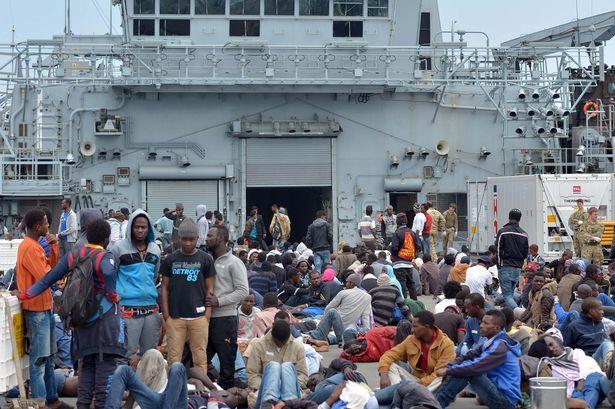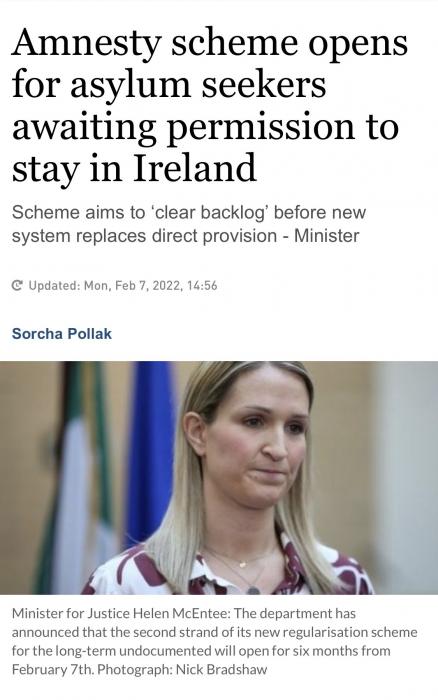Captain Haddock
- Location: Marlinspike Hall
- Registered: 8 Oct 2012
- Posts: 7,932
Simon Jones
@SimonJonesNews
· 2h
The Ministry of Defence is expected to take charge of operations in the Channel within weeks. The Education Secretary says the Navy would be able to coordinate operations, allowing Border Force to concentrate on implementing the legislation of the Nationality & Borders Bill.
The Dover MP Natalie Elphicke has welcomed plans for the MOD to take charge of operations in the Channel: ‘Everyone knows the Royal Navy rules the waves. This sends a clear message how serious Britain is about putting a stop to the small-boat crossings.’






(On Friday, 118 illegal immigrants crossed the English Channel in 4 boats.
581 have now arrived this month (well over twice reported total for Jan 2021).
The number of people that have come since January 2018 is approaching 39,586...)
"Shall we go, you and I, while we can? Through the transitive nightfall of diamonds"
Captain Haddock
- Location: Marlinspike Hall
- Registered: 8 Oct 2012
- Posts: 7,932
It refereed to the appointment of Dan O'Mahoney as “Clandestine Channel Threat Commander” two years ago which seems to have had the same effect as Basil Fawlty hiring O'Reilly the Irish builder.
When he was appointed 'Clandestine Channel Threat Commander' - a role which was never existed before his arrival - the Home Office said his job was to "bring together 15 agencies" involved in security in the channel.
The Home Office won't say how much he's paid - only that employees are paid "in accordance with their pay grade".
They've failed to disclose how he got the job, and how many people were considered for it.
And no details of his team appeared in the department's annual report this year, beyond noting that he had been appointed.
Another publicity seeking cunning plan which has made half of bugger all difference!
The Navy may indeed be known to 'rule the waves' but as long as the dinghies 'waive the rules' expect more of the same.................
Jan Higgins, Matey and Button like this
"Shall we go, you and I, while we can? Through the transitive nightfall of diamonds"
Captain Haddock
- Location: Marlinspike Hall
- Registered: 8 Oct 2012
- Posts: 7,932
From W/E FT 22/01.
On Dover Beach.
As a winter sunrise gilds the white cliffs and wheeling gulls perform what locals call “the bird ballet” over the harbour, Dover at daybreak looks almost magnificent. Hotchpotch as its pebbles, enduring as its castle and rather rundown behind its seafront, Dover is ever an emblem of Britain.
For this famous shore, more than 28,400 people risked their lives in flimsy smugglers’ boats last year. Most of those who continue to arrive will request political asylum from a Britain perceived to be safe and promising.
So it is strange indeed that here, on Britannia’s very doorstep, free speech is choking.
“I wish I could talk openly,” murmurs a lifeboat coxswain. “I’d love to tell you my name,” a security guard confides. “Just call me a spokesperson?” requests the chief executive of a charity. “You can’t identify me,” a Border Force officer insists. Even the lady walking her dog prefers anonymity (though she waived his right: Max).
To lower anyone’s voice in Dover, just ask, “What do you think about the boats from France?” Everyone hesitates. Are we receiving people in need or in want? The threat of being sacked, reluctance to be identified with a particular view and fear of online abuse seem to govern every tongue.
In Dover we’re always the front line. Wars, refugees, migrants — that’s what it is here
Happily, silence goes against the Dovorian nature and the national grain. If you wish to know what is actually happening here, and allow them anonymity, then rescuers, guards, emergency services, enforcement agents, officials, seafarers and locals have much to reveal about “the migrant crisis”.
No one I spoke to used the phrase. On the edge of the English Channel, the people who are living and dealing with “the boat people”, as one called them, are long past crude headlines. Whisper it, but Dover is doing something extraordinary.
People set out from the French coast most nights, aiming for the UK border, mid-Channel. Despite British government plans to give the Royal Navy lead responsibility for the situation, dinghies are undeterred by the military. Last week one ignored a French warship, refusing to stop until the people aboard saw the Union Jack on a Border Force vessel, proving the frontier had been crossed. Another dinghy got into difficulty off Berck-sur-Mer. A Sudanese man in his twenties died.
Puttering across the freezing water, dinghies are tracked by Dover Coastguard. Helicopters and spotter planes use thermal imaging to count people aboard. The Coastguard designates each dinghy a “radar target” for rescuers who bring the people in them to Dover Western Docks.
These hectic efforts have so far prevented a repeat of the tragedy of November 24 last year, when 27 men, women and children drowned. Given the Channel is thronged with ships, weathers and tides, it is astonishing that many more have not died. Naval command is unlikely to change much about this remarkably effective Coastguard-led operation, now over three years old. Notably, the RNLI insists it will continue to be tasked by the Coastguard, not the military.
The first Britons you meet, if you come to Britain this way, are lifeboat crews or Border Force. Although rescue records displayed on the walls of Dover lifeboat station go back to 1837, the RNLI no longer celebrates its successes. “Sometimes we’re so busy we don’t even count them,” a spokesperson said.
Rightwing condemnation of the RNLI last year inspired record-breaking donations, but Dover crews now walk to their shifts looking watchful and tight-lipped. “It’s incredibly rewarding to help people, of course,” said an anonymous coxswain. “In Dover we’re always the front line. Wars, refugees, migrants — that’s what it is here. And I’ve seen the faces of people ashore who wish you weren’t doing what you’re doing.”
Being unable to speak freely frustrated him, as it did a Border Force agent hauling on his drysuit in a harbour car park. This man’s team recover dinghies abandoned after rescues.
“We’re the RAC,” he grinned, “We do the long slow tow.” Asked about the people in the boats, his expression became suddenly pained. “It feels mad,” he muttered. “They put themselves in danger. If you put your wife and children on one of those at sea, you’d be charged.”
“Would you do pushbacks?” I asked.
Border Force jet-skis have been filmed trapping and forcibly turning a practice dinghy: pushback is the fanged question of the moment.
“No! Can you imagine? Doing that to a flimsy boat at sea? It turns over, people drown.”
The Public and Commercial Services Union, representing many members of Border Force, is threatening strikes over pushback, citing contravention of maritime law.
But home secretary Priti Patel repeated her commitment to pushback on Monday, having told the Justice and Home Affairs Committee in October, “None of this is illegal at all. There is a narrow [legal] basis for operationalisation of this tactic.”
The men who will do it, given the order, were on the slipway at Dover beach, readying their jet-skis for patrol. Also Border Force, they are strikingly macho.
“We’ve practised it — we know it works!” an agent from Plymouth said excitedly. He talked about the thrill of going 12 miles out on the small fast skis. “We’ve fitted AIS to them, so ships can see us unless we’re doing something covert.” (The Automatic Identification System allows vessels to be tracked in real time, when switched on.)
“We’re not members of the union,” said his colleague, a former soldier. “No one has been down here to ask what people on the front line feel. I served in the Falklands. The mission then was, ‘Get them off there’. If the mission this time is ‘push them back’, this team won’t have a problem with it.”
“We’re recruiting!” said his team leader. “You should apply!”
The home secretary’s Nationality and Borders Bill, currently at Committee stage in the House of Lords, empowers “enforcement officers” to require ships (defined as “every description of vessel and any other structure”) to leave UK waters, permitting “reasonable force” to divert them. If pushbacks come, what happens mid-Channel would seem to depend on whether your dinghy is met by the navy, this jet-ski team or agents like the man in the car park.
“We’re the local office,” sighed the latter. “They’re national. We should be pushing passports about! But instead . . . ” He set off to search, rescue and tow.
Assuming you are rescued, your promised land now draws near. Here are the ferries, the castle and cliffs. On fine afternoons the sky is Battle of Britain blue. It even buzzes with a Merlin engine as someone flies over in the two-seater “White Cliffs of Dover” Spitfire experience.
You pass the Western Docks Revival scheme. Many Dovorians are doubtful about this deserted new £250m marina and annoyed by DFLs — “Down from Londons” — pushing property prices up. But what about the small boats?
“We never see them,” smiled a retired teacher who says she loves living here. “It’s all kept very quiet.”
“You can’t have everyone coming in,” said a local man collecting pebbles his wife likes to paint. “But we’d do the same, wouldn’t we?”
Their daughter-in-law works for an organisation that helps asylum-seekers. “When they tell her they want to take their own lives, that takes a toll,” he said.
With Border Force and others hiring locally, the town has a renewed sense of bustle and boom © Harry Mitchell
The most obvious effects on Dover are hotels full of contractors and an employment boom. Border Force is hiring, the RNLI has just taken on 13 new crew, the Best Western hotel has been sponsoring work visas for new staff from India, and many locals have found jobs in high-visibility jackets.
You want to see they’re all right. Because they must be desperate, mustn’t they?
So many people wear them around the dockside processing centre that your first feeling, as you are escorted on to British soil, might be intimidation.
But what is extraordinary about attitudes here is the way they defy appearance and expectation. I spoke to security guards at the entrance to the processing tents. Two are retired local men. The first had joined up “to make sure these people were being treated well”, he said, adding, “And they are. We should be proud.”
The second had just seen a group ashore. “They’re safe now,” he said. “There are very young children with them. They’re being looked after. I come down from Ramsgate for a 12-hour shift — and you’re doing your bit, aren’t you? You want to see they’re all right. Because they must be desperate, mustn’t they?”
I suggested that “doing your bit” is the language of the second world war, of heroic national effort.
“Yes it is!” he said. He was scared to name his employers, Mitie Care & Custody. Running processing and holding centres boosted Mitie’s revenues over the six months to September 2021 to £60m, a £10m increase the company ascribes to “small boat arrivals on the South Coast”.
Migration is not normally framed as a blessing to business, but employees of HATS, a patient transport company, Interforce, a security company, Loyalty Connections, a Kent coach company, as well as police, Home Office and medical staff now give these docks an air of bustle and boom they cannot have known for years.
Shouts of laughter and good-humoured greetings are notable, even when it is cold and raining. The sense of common purpose, of meaningful endeavour, of “doing your bit”, is palpable. And even on minimum wage, nothing makes you feel so wealthy or so free as the destitute and detained.
Finally, I glimpsed the refugees through the wire: tracksuited, wrapped in blankets, shuffling in white flip-flops. One woman carried a child. A man carried a toddler. There were several young men, boys, all moving in the same exhausted drift.
It seemed extraordinary that a couple of hours ago these dazed figures were an almost insanely daring group of travellers squatting together on a tube in a dark and heaving sea.
I was not allowed near them. Volunteers who work with detainees told me that their stories begin to come out when they feel safe, in some weeks’ time, but that they rarely if ever talk about the fearful Channel crossing.
They were driven across a car park to another fenced-off area to begin a journey through the UK asylum system that will take years of their lives. Some of the men will spend months in Napier barracks near Folkestone. There, one local who is happy to put her name to her opinions will teach them yoga (unpaid).
“Dover born and bred” Kay Marsh, a human-rights activist and migrant support coordinator at local charity Samphire, is a well-known figure in the town, and unbowed by abuse from the far right.
Human-rights activist and volunteer Kay Marsh on Dover beach
Human-rights activist Kay Marsh says staff at Napier barracks, where asylum seekers are housed, are ‘genuinely nice people . . . Priti Patel is not representative of the people who work here’ © Harry Mitchell
Marsh was appalled but unsurprised by the squalor, the mental-health crisis among residents and the Covid-19 outbreak she first found at Napier, where conditions have improved somewhat, she says. What surprised her was the staff.
“I’d prejudged everyone,” she said. “Just like you can’t judge the boat people, you can’t judge the staff. Jobs like G4S, contracted from the Home Office, they’re low-level jobs that people can get — and the staff are genuinely nice people. They’re making a difference to people’s lives, they really are. The people in charge don’t give these organisations a good name. Priti Patel is not representative of the people who work here.”
Individuals, groups and even nations can be prejudged. Despite polls showing a softening of British attitudes to migration since Brexit, the tone and language with which government and media frame events here led me to expect outrage, nationalism and xenophobia around Dover, which voted strongly for Ukip and Brexit.
Instead I found people from every sort of background, holding every shade of private view, whose strongest feeling for the people in the small boats is compassion, whose instinctive reaction is to help, and whose efforts are extraordinarily dedicated and inspiringly effective.
It seems possible that “the public”, no less than “the migrants”, are being caricatured by politicians and press. It remains to be seen how the town, nation and navy will feel about warships confronting dinghies in the Channel. But what surprised me most about the hushed voices I heard in Dover is how proud they made me feel to be British.
Horatio Clare is the author of ‘Down To The Sea In Ships: Of Ageless Oceans and Modern Men’ (Chatto & Windus)
The Gov, Ross Miller and ray hutstone like this
"Shall we go, you and I, while we can? Through the transitive nightfall of diamonds"








 "Shall we go, you and I, while we can? Through the transitive nightfall of diamonds"
"Shall we go, you and I, while we can? Through the transitive nightfall of diamonds"


